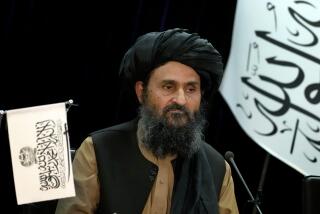Persian Gulf carriers order $40 billion worth of planes
- Share via
DUBAI, UNITED ARAB EMIRATES — Persian Gulf carriers ordered 140 planes for nearly $40 billion from Airbus and Boeing Co. on Sunday, the opening day of the Dubai Air Show, in a boost for the global airline industry and a sign of the Middle Eastern airlines’ rapid expansion.
With their economies prospering on soaring energy prices, the oil-rich states, in particular the United Arab Emirates, have been plowing money into ambitious airline expansion programs that are a boon for the manufacturers.
“These purchases are fundamentally important for Airbus and Boeing,” said John Strickland, director of JLS Consulting, a London-based aviation consulting firm.
He said the Mideast “aviation giants” -- Dubai-based Emirates, Qatar Airways and Abu Dhabi-based Etihad -- were key customers of both plane makers.
“These big orders are very important because they will not come in this size from Europe or the U.S. any time soon,” he said.
The contracts and order options for a total of nearly $35 billion inked by Emirates Airline on Sunday set a historic record, according to Sheik Ahmed bin Saeed Maktoum, the company’s head. “This is the largest-ever aircraft commitment in civil aviation made by any airline in a single order,” he said in a statement.
With at least 98 firm orders signed Sunday, Airbus was by far the biggest beneficiary of the buying bonanza. But on the same day, the European company said that a weakening U.S. dollar was cutting into profit, pushing it to look into sales in euros and possibly shift more salaries outside the euro zone.
“The weak dollar is a huge challenge for us as the aviation industry trades in dollars and a lot of the world’s manufacturers are based in the U.S.,” spokesman David Velupillai told Dow Jones Newswires.
A weak U.S. dollar does not make the planes more expensive, but it lowers the company’s profit because half of Airbus’ costs are paid in euros, he said. “We’re also trying to cut down costs by placing our workforce in dollar zones and are importing a lot of materials from the U.S.”
On the opening day of the show, Emirates Airline announced that it had signed a massive order for 78 aircraft from Airbus and 12 Boeing 777 jets, for a total of $23.4 billion, with an option to buy 50 more Airbus planes for nearly $12 billion.
The airline’s firm order included eight of Airbus’ new superjumbo A380s, the world’s largest commercial jet. Emirates said it had ordered 58 superjumbo jets to date, making it the model’s biggest customer. The airline is expected to start taking delivery of the plane in August.
Maktoum signed the contracts with Airbus Chief Executive Thomas Enders and Lee Monson, vice president of Boeing Commercial Airplanes for the Middle East and Africa. Emirates said it also bought aircraft engines from Rolls-Royce, Engine Alliance and General Electric Co.
Qatar Airways, meanwhile, ordered 27 Boeing 777 planes in part of its plan to almost double its fleet of 58 aircraft to 110 planes by 2010. Saudi carrier National Air Service said it would buy 20 Airbus A320s.
Dow Jones reported that the Qatar Airways deal was worth $13.5 billion and the Saudi airline contract $2.2 billion.
The Dubai Air Show is closely watched as a measure of the condition of the Persian Gulf air carriers, which are taking advantage of shifting travel routes to substantially expand their fleets. The companies hope to turn the region into a major international hub.
“European carriers are also successful in exploiting new traffic flows and we cannot expect them to fall over and let the Middle East carry on without competition challenge,” Strickland said.
More to Read
Inside the business of entertainment
The Wide Shot brings you news, analysis and insights on everything from streaming wars to production — and what it all means for the future.
You may occasionally receive promotional content from the Los Angeles Times.










